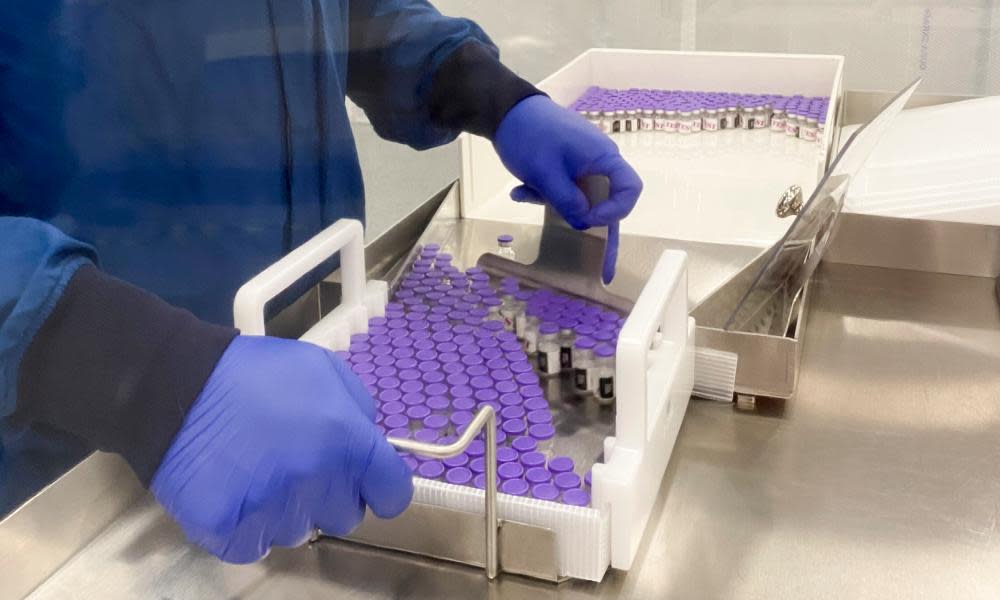UK likely to be first western country to license a Covid vaccine

Britain is expected to become the first western country to authorise a coronavirus vaccine, raising the prospect of immunisations beginning weeks ahead of the rest of Europe.
The UK medicines regulator is set to license the Pfizer/BioNTech vaccine for emergency use within days, and possibly as soon as Wednesday. Britain has ordered 40m doses, of which 10m are expected to be available this year.
Meanwhile the European regulator suggested on Tuesday that it might not reach a decision until the end of December, which would make the start of vaccination programmes across Europe unlikely before 2021.
default
Such an outcome would be viewed as a political triumph for Boris Johnson. The UK could begin immunisations before any other country in the west thanks to a globally well-regarded body, the Medicines and Healthcare products Regulatory Authority (MHRA).
With less than a month until the end of the Brexit transition period, its supporters are also likely to seize on the MHRA’s ability to act at speed and alone for the first time, without waiting for the rest of Europe.
Until 1 January 2021, licensing decisions on medicines and vaccines would have been taken by the European Medicines Agency (EMA), which was based in London until Brexit. But the UK government passed regulations to allow the MHRA to give emergency authorisation to Covid vaccines if manufacturers had sufficient data to apply before the end of the year.
A Whitehall source claimed the UK would have a “head start”, saying: “The MHRA’s approval of the Pfizer vaccine, when it comes, will be a big moment not just for the UK but for the world.”
The official claimed: “From our perspective, us making provision to be able to authorise a vaccine ahead of the EMA was definitely the right call. It means we will have a three-week head start on every other country in Europe in terms of deploying this vaccine … Germany might have a better diagnostics industry than we do but when it comes to deploying vaccines we are No 1.”
The MHRA has been conducting a rolling review of several vaccines over recent months, including that of Pfizer/BioNTech, which submitted its final data on 23 November. A government source said there was an expectation the regulator would approve the Pfizer/BioNTech vaccine within days, even as early as Wednesday.
The MHRA is an independent body, however. Speaking in the Commons on Tuesday before a vote on new stricter tiered restrictions, Johnson sounded a note of caution about the likely speed of approval.
“We have to be realistic and we have to accept that this vaccine is not here yet, no vaccine is here yet,” the prime minister said. “And whilst all the signs are promising, and almost every scientist I have talked to agrees that the breakthrough will surely come, we do not yet have one that has gained regulatory approval. We can’t be completely sure when the moment will arrive. And until then, we cannot afford to relax, especially during the cold months of winter.”
Europe has only just begun to consider data from the final trials of the Pfizer vaccine. On Tuesday the EMA announced it had received final data from Pfizer and Moderna, the US company making a similar vaccine. Both have reported 95% efficacy in phase 3 trials.
The EMA said the assessments would be accelerated thanks to its own rolling review of the data from earlier trials and other information, with an opinion on authorisation coming potentially within weeks.
But the regulator suggested it might not be able to make a decision until the end of December. “The agency and its scientific committees will continue working on the assessment over the Christmas period,” it said in a statement. “If the data submitted are robust enough to conclude on the quality, safety and effectiveness of the vaccine, EMA’s scientific committee for human medicines will conclude its assessment during an extraordinary meeting scheduled for 29 December, at the latest.”
If the EMA gives the green light, the European commission will consider within days whether to grant conditional marketing authorisation, which would mean the vaccine is approved for use in all member states.
In the US, the Food and Drug Administration is examining all the Pfizer/BioNTech data. It has said it will meet to make a decision on 10 December.
Related: Protecting others and record of vaccines main reasons to get Covid jab, poll shows
UK plans for mass immunisation are well advanced. They will be logistically complex, however, because of the need to keep the vaccine in freezers at -70C. Once removed, it can be stored in a fridge at 2C-8C for five days.
Once transported from Belgium, where it is produced, the MHRA and Public Health England will conduct “quality assurance tests” to check transportation conditions have been followed. It will then be sent to locations including hospitals, where NHS leaders expect frontline health workers to begin receiving it. Sources estimate it will be four to six days between the vaccine’s arrival and the first doses being administered.
The UK regulator is also looking at the data from trials of the Oxford University/AstraZeneca vaccine, which has reported 62% efficacy in a large trial but 90% efficacy in a subset of volunteers under the age of 55. The UK has ordered 100m doses of the vaccine, which does not need to be kept in freezers and is intended to be the mainstay of the immunisation programme.

 Yahoo Movies
Yahoo Movies 
